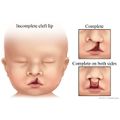Our Health Library information does not replace the advice of a doctor. Please be advised that this information is made available to assist our patients to learn more about their health. Our providers may not see and/or treat all topics found herein.
Topic Contents
Cleft Palate
Condition Basics
What is cleft palate?
Cleft palate is a treatable birth defect. It happens when the roof of the baby's mouth (palate) doesn't develop normally during pregnancy, leaving an opening (cleft) in the palate that may go through to the nasal cavity. A cleft can form on any part of the palate, including the front part of the roof of the mouth (hard palate) or the small flap of tissue that hangs down from the soft palate (uvula). It may appear by itself or along with other birth defects of the face and skull, such as a cleft lip.
Cleft palate and cleft lip are the most common birth defects of the head and neck. Until a cleft palate is treated with surgery, it can cause problems with feeding, speech, and hearing.
What causes it?
Doctors aren't sure what all of the causes are. But your baby may be more likely to have a cleft palate if:
- You use certain medicines while you're pregnant.
- You use alcohol or drugs while you're pregnant.
- You or a household member smokes while you're pregnant.
- You are exposed to radiation or infections while you're pregnant.
- Either birth parent has a family history of cleft palate.
It's important to take good care of yourself before and during your pregnancy so that your baby will be as healthy as possible.
If either birth parent has a family history of cleft palate, you may want to think about genetic counseling. It can help you understand your chances of having a child with a cleft palate.
What are the symptoms?
Some forms of cleft palate are easy to see when the child is born. But even if the cleft palate doesn't affect how the baby's face looks, it can usually be seen inside the mouth.
Babies who have a cleft palate often have feeding problems because they aren't able to suck and swallow normally. But this doesn't always last, especially with treatment.
How is it diagnosed?
A doctor can diagnose a cleft palate by looking at the baby's mouth shortly after birth. Fetal ultrasound can sometimes find a cleft palate, especially if the cleft palate is severe and occurs along with a cleft lip. But ultrasound doesn't always find the problem.
How is cleft palate treated?
Treatment for cleft palate involves a team of health care providers. The type of treatment depends on how severe the problem is.
Surgery is the most common treatment for a cleft palate. It's usually done before a child is 12 months old. Before surgery, your baby may need treatment for breathing or feeding problems. Your baby may also wear a mouth support (such as a dental splint) or a soft dental molding insert along with medical adhesive tape.
As your child grows, your child will probably need more than one operation. But the problem is normally fixed by the time a child is a teen. Although surgery often leaves scars, the palate usually heals well and leaves few signs of the cleft. A child's facial bones most often grow as expected, and the child speaks more clearly.
Some children need treatment for other problems, such as speech, hearing, or teeth problems; sinus and ear infections; or problems from surgery.
How can you care for your child?
Caring for a child who has a cleft palate may take time and patience. If your baby has a cleft palate, you may need help with feeding. A nurse can guide you on feeding techniques.
As your child grows, watch for infections and pay special attention to your child's dental care, hearing, and speech. Talk to your doctor if you notice any problems or you have questions or concerns.
Be open to talking with your child about their condition and answering their questions. For example, your child may want to know how a cleft palate forms. This will help your child know how to answer questions from other children and adults.
If you need help, seek support from friends and family. You may find it helpful to talk with your doctor or to see a counselor. You can also join a support group to meet others who are going through similar challenges.
Related Information
Credits
Current as of: July 31, 2024
Author: Ignite Healthwise, LLC Staff
Clinical Review Board
All Healthwise education is reviewed by a team that includes physicians, nurses, advanced practitioners, registered dieticians, and other healthcare professionals.
Current as of: July 31, 2024
Author: Ignite Healthwise, LLC Staff
Clinical Review Board
All Healthwise education is reviewed by a team that includes physicians, nurses, advanced practitioners, registered dieticians, and other healthcare professionals.
This information does not replace the advice of a doctor. Ignite Healthwise, LLC disclaims any warranty or liability for your use of this information. Your use of this information means that you agree to the Terms of Use and Privacy Policy. Learn how we develop our content.
To learn more about Ignite Healthwise, LLC, visit webmdignite.com.
© 2024 Ignite Healthwise, LLC.





